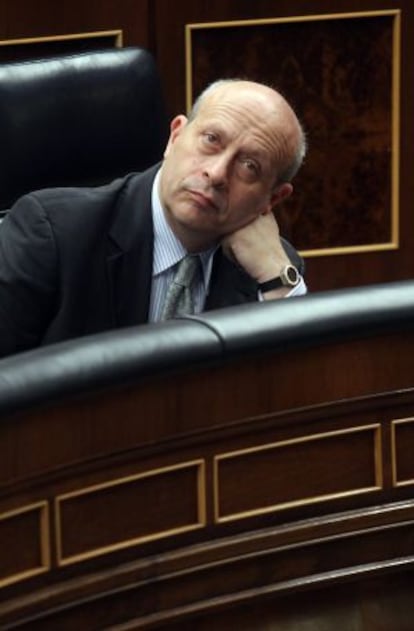Education chief who may have spoken his mind too often
José Ignacio Wert is proving to be the most controversial minister in Prime Minister Mariano Rajoy’s government

They say Mariano Rajoy's patience must be running out. Since King Juan Carlos told Rajoy about the dressing-down the monarch gave to Education Minister José Ignacio Wert on October 12 for his comments to "Hispanicize" all students in Catalonia, those close to the prime minister say he hasn't been at all happy with the Cabinet official.
And this latest controversy only adds to the pressure Rajoy is already feeling from countless numbers of parents who have taken to the streets to demand Wert step down because of his education reforms.
Described by many who know him personally as a sort of "Jiminy Cricket" character -- small but wants to be heard -- Wert has always spoken his mind.
Coming from a family of eight noisy siblings, where the household was run by a mother with a great sense of humor and a father who managed a car dealership, Wert was usually the quiet one, says his brother Carlos. But after nine months on the job, his sarcastic and bold comments are causing a lot of discomfort among his colleagues, including Cabinet chief Jorge Sainz, say administration officials.
Not only is Wert in charge of the country's school curriculum, but he was also handed the portfolios for sports and culture, the three previously separate ministries being combined when Rajoy came to office.
It takes a lot of effort to hold a conversation with Wert, some say. Because of his cutting, sometimes offensive, remarks and penchant for trying to pretend he is more of an intellectual than others, he doesn't come across well at times. Once, when he was named to the board of directors at BBVA by bank president Francisco González in 2003, the bank official had to make excuses for him because of his frank public jibes and jokes aimed at some of the most powerful men in the financial world.
"Hispanicize Catalan students" to make them "feel as proud of being Spanish as Catalan," he told Congress
"He has the capability to quickly comprehend what is happening around him. In four months he can completely dominate the environment in which he has been placed," says José Juan Toharia, who worked with him in the polling and marketing survey firm Demoscopia.
When he entered government, Wert immediately announced his plans to change the public school curriculum to focus more on civic and constitutional affairs -- removing the more liberal classes geared to citizens' rights and interpersonal relationships that had been passed by the previous Socialist government. "It caused social divisions and went beyond what a civic education curriculum requires," Wert said of the Socialists' education reform.
The education chief also announced plans to increase the maximum number of students per class from 27 to 30 in primary schools and from 33 to 36 in high schools, and freeze supplementary salary payments for teachers. Teachers' protests have not stopped since his proposals were announced.
In culture, Wert could not do anything to stop or even defend the cutbacks in the sector, which now make it difficult for filmmakers and artists to receive special funding or grants for their projects.
Those who know Wert say he hasn't made any significant moves in the area of illegal downloading, even though he announced last December, during the swearing-in of the secretary of state for culture, José María Lassalle, that he was ready to take action. "No one is going to respect the culture of a country that leads in the ranking of illegal downloads. We won't get anywhere if this continues," Wert said then. But many close to him say he has no real motivation to take this bull by the horns.
His closest advisors had to be appointed because, "among other things, he isn't known to have many friends," says one person who worked with him.
Wert sees politics as a dueling sport. At least perhaps that is the way he viewed it when he began his political career with Joaquín Ruiz-Giménez's Izquierda Democrática party in the late 1970s. He later joined Adolfo Suárez's Unión de Centro Democrático (UCD) and then Óscar Alzaga's center-right Popular Democratic Party (PDP), which later merged to form the Popular Alliance (AP) of Manuel Fraga - the predecessor to today's Popular Party (PP).
Many believed that when Rajoy named Wert and then-Madrid Mayor Alberto Ruiz-Gallardón to head up the Justice Ministry it was a gesture to the PP moderates. But now, it appears that some of his Cabinet members -- especially these two -- are in a race to see who can capture the most headlines.
"Hispanicize Catalan students" with the goal of making them "feel as proud of being Spanish as Catalan," Wert told Congress on October 10, stirring up the pro-independence supporters across Catalonia.
When asked two days later what he thought of King Juan Carlos' scolding, Wert stuck to his guns. "I am very proud of what I said."
Tu suscripción se está usando en otro dispositivo
¿Quieres añadir otro usuario a tu suscripción?
Si continúas leyendo en este dispositivo, no se podrá leer en el otro.
FlechaTu suscripción se está usando en otro dispositivo y solo puedes acceder a EL PAÍS desde un dispositivo a la vez.
Si quieres compartir tu cuenta, cambia tu suscripción a la modalidad Premium, así podrás añadir otro usuario. Cada uno accederá con su propia cuenta de email, lo que os permitirá personalizar vuestra experiencia en EL PAÍS.
¿Tienes una suscripción de empresa? Accede aquí para contratar más cuentas.
En el caso de no saber quién está usando tu cuenta, te recomendamos cambiar tu contraseña aquí.
Si decides continuar compartiendo tu cuenta, este mensaje se mostrará en tu dispositivo y en el de la otra persona que está usando tu cuenta de forma indefinida, afectando a tu experiencia de lectura. Puedes consultar aquí los términos y condiciones de la suscripción digital.








































